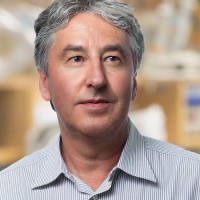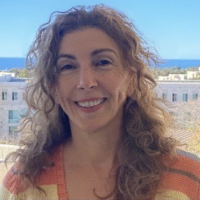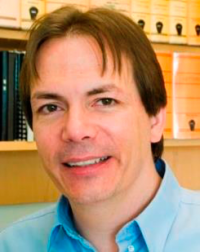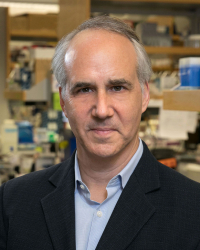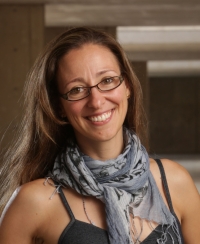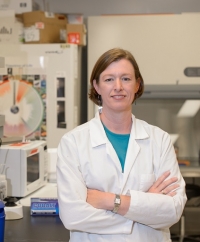Imagining the Future of Anthropogeny
Biographical Sketches: Co-Chairs
Salk Institute for Biological Studies
Gerald F. Joyce is President and Professor at the Salk Institute for Biological Studies in La Jolla, California, and a Co-director of CARTA. Dr. Joyce received his BA from the University of Chicago in 1978 and both an MD and PhD from the University of California, San Diego in 1984. He carried out postgraduate medical training at Scripps Mercy Hospital in San Diego and postdoctoral research training at the Salk Institute before joining the faculty of The Scripps Research Institute in 1989. In 2017 Dr. Joyce moved his laboratory to the Salk Institute, where it is part of the Jack H. Skirball Center for Chemical Biology and Proteomics. While continuing his academic faculty appointment, he served as the Institute Director of the Genomics Institute of the Novartis Research Foundation (GNF) from 2014 until 2021. Dr. Joyce’s research involves the test-tube evolution of functional RNA and DNA molecules and their potential application in clinical diagnostics and therapeutics. He has a longstanding interest in the origins of life and the role of RNA in the early history of life on Earth. His research has led to the development of the first self-replicating RNA enzyme, which is capable of exponential growth and evolution. It also has led to the development of an RNA enzyme that catalyzes the polymerization and exponential amplification of other RNA molecules.
UC San Diego
Katerina Semendeferi is Professor of Anthropology and Director of the Laboratory for Human Comparative Neuroanatomy at UC San Diego. She is CARTA Co-Director and elected fellow of the American Association for the Advancement of Science. Semendeferi’s studies of the fronto-limbic circuitry showed that the relative size of the frontal cortex is remarkably similar across apes and humans and that evolutionary changes are found in some, but not all, regions of the human frontal lobe and amygdala. Her laboratory explores links between the phylogenetically reorganized brain regions and vulnerabilities observed in atypical human neurodevelopment (Autism and Williams Syndrome). Semendeferi has been involved with multiple lines of research in human evolution, including the fossil record, and pioneered the application of noninvasive imaging tools to the study of the brain of the apes. She maintains an interest in bringing together multiple fields of inquiry including efforts to bridge classical quantitative neuroanatomy with the field of induced pluripotent stem cells and brain organoids.
Biographical Sketches: Speakers
University of Washington School of Medicine
Evan Eichler, PhD, is a Professor and Howard Hughes Medical Institute Investigator in the Department of Genome Sciences, University of Washington School of Medicine, and serves on the CARTA External Advisory Board. He graduated with a B.Sc. Honours degree in Biology from the University of Saskatchewan, Canada, in 1990. He received his PhD in 1995 from the Department of Molecular and Human Genetics at Baylor College of Medicine, Houston, Texas. After a Hollaender postdoctoral fellowship at Lawrence Livermore National Laboratory, he joined the faculty of Case Western Reserve University in 1997 and later the University of Washington in 2004. He was a March of Dimes Basil O’Connor Scholar (1998–2001), appointed as an HHMI Investigator (2005), awarded an AAAS Fellowship (2006) and the American Society of Human Genetics Curt Stern Award (2008), and elected to the National Academy of Sciences (2012) and the National Academy of Medicine (2017). He is an editor of Genome Research and has served on various scientific advisory boards for both the NIH and NSF. His research group provided the first genome-wide view of segmental duplications within human and other primate genomes and he is a leader in an effort to identify and sequence normal and disease-causing structural variation in the human genome. The long-term goal of his research is to understand the evolution and mechanisms of recent gene duplication and its relationship to copy number variation and human disease with a specific emphasis on the genetic architecture of autism and neurodevelopmental delay.
UC San Diego
Pascal Gagneux is CARTA's Executive Co-Director, a Professor of Pathology and Anthropology, and the Department Chair of Anthropology at UC San Diego. He is interested in the evolutionary mechanisms responsible for generating and maintaining primate molecular diversity. The Gagneux laboratory studies cell-surface molecules in closely related primates species. His focus is on glycans, the oligosaccharides attached to glycolipids and glycoproteins of the surfaces of every cell and also secreted into the extra-cellular matrix. Gagneux's laboratory is exploring the roles of molecular diversity in protecting populations from pathogens as well as potential consequences for reproductive compatibility. Dr. Gagneux’s interest is in how glycan evolution is shaped by constraints from endogenous biochemistry and exogenous, pathogen-mediated natural selection, but could also have consequences for sexual selection. Dr. Gagneux has studied the behavioral ecology of wild chimpanzees in the Taï Forest, Ivory Coast, population genetics of West African chimpanzees, and differences in sialic acid biology between humans and great apes with special consideration of their differing pathogen regimes. In 2011, while Associate Director of CARTA, Dr. Gagneux helped to establish a graduate specialization in Anthropogeny at UC San Diego. This wholly unique graduate specialization is offered through eight participating graduate programs in the social and natural sciences at UC San Diego.
University of California, Los Angeles
Daniel Geschwind is the Gordon and Virginia MacDonald Distinguished Professor of Neurology, Psychiatry and Human Genetics at UCLA and serves on the CARTA External Advisory Board. In his capacity as Senior Associate Dean and Associate Vice Chancellor of Precision Health, he leads the Institute for Precision Health (IPH) at UCLA. In his laboratory, his group has pioneered the application of systems biology methods in neurologic and psychiatric disease, with a focus on autism spectrum disorders (ASD) and neurodegenerative conditions. His laboratory has made major contributions to identifying genetic causes of ASD, defining the molecular pathology of ASD and allied psychiatric disorders, and has worked to increase diversity in ASD research. His work in dementia is focused on the mechanisms of tauopathies, where his laboratory is developing novel therapeutic approaches.
Dr. Geschwind sits on editorial boards of Cell, Science and Neuron, and is among the highest cited neurologists in the world. He has received several awards for his laboratory’s work including the American Neurological Association (ANA) Derek Denny-Brown Neurological Scholar Award, most recently the Society of Biological Psychiatry Gold Medal Award and the American Academy of Neurology’s 2022 Cotzias Lecture and Award and is an elected Member of the American Association of Physicians and the National Academy of Medicine.
Arizona State University
Yohannes Haile-Selassie is a professor in the School of Human Evolution and Social Change and director of the Institute of Human Origins at Arizona State University (ASU), in addition to serving on the CARTA External Advisory Board.
His research interest is understanding the paleobiology and paleoecology of early human ancestors based on the fossil record. He has made fossil discoveries that are significant in human origins research and leads an international multidisciplinary team that conducts fieldwork in the Afar Region of Ethiopia.
University of California, San Diego
Robert Kluender is a Professor of Linguistics at UC San Diego and serves on the CARTA Internal Advisory Board. He has been a member of CARTA since the mid-1990s, and has co-organized two CARTA symposia during that time: one on language evolution, and the other on domestication and human self-domestication. He also serves on the advisory board of the Center for Research in Language at UC San Diego. The underlying question addressed in his research is the extent to which the natural limitations of human cognition shape and constrain the human language system: how much of linguistic competence can be reduced to facts of performance, and how language is represented and processed in the brain. The Language and Brain Laboratory addresses these questions in experimental studies of language processing focused on the interaction of language structure, working memory, semantics and pragmatics, particularly as it unfolds in real time. Kluender also has long-standing interests in the origins of apparent linguistic constraints, the evolutionary foundations of language, and the intersection of language, consciousness, and the physical world.
University of California San Diego
Maria Carolina (Carol) Marchetto is an Assistant Professor at the Anthropology Department, UC San Diego, and serves on the CARTA Internal Advisory Board. Dr. Marchetto earned a BSc in Biological Sciences in 1998 and a Ph.D. in Microbiology in 2005 from the University of Sao Paulo, Brazil. Dr. Marchetto moved to San Diego in 2005 for her postdoctoral research in stem cells and neuroscience in the lab of Dr. Fred Gage at the Salk Institute. Prior to her appointment at UC San Diego, Dr. Marchetto was a Staff Scientist at the Laboratory of Genetics at The Salk Institute where she led projects that studied neuronal development using human and nonhuman primate stem cells. Her current work focuses on using patient-derived induced pluripotent stem cells to study the cellular behavior of human neurons in neuropsychiatric and neurodevelopmental conditions such as Autism and Bipolar Disorder. Dr. Marchetto’s work is also focused on human evolution in the context of human brain expansion and neuronal development. Her innovative approach uses stem cell models from human and nonhuman primate species to test hypotheses about the role of disruptions to human-specific cellular and molecular signatures in development and their potential impact on mental health. She is a BRAINS Program Fellow, and her work has received funding from the National Institutes of Mental Health and the Larry L. Hillblom Foundation.
Salk Institute for Biological Studies
Terrence Sejnowski is a Howard Hughes Medical Institute Investigator and professor and director of the Computational Neurobiology Laboratory at The Salk Institute. He is also professor of biology and an adjunct professor of physics, neurosciences, psychology, cognitive science, and computer science and engineering at UC San Diego. He is director of the Institute for Neural Computation and director of Training Programs in Cognitive Neuroscience and Computational Neurobiology at UC San Diego and serves on the CARTA External Advisory Board. The goal of his research is to build linking principles from brain to behavior using a combination of theoretical and experimental approaches ranging from the biophysical to the systems level. He is founding editor of Neural Computation and President of the Neural Information Processing Systems Foundation. He is a past recipient of the Presidential Young Investigator Award, and was Wiersma Visiting Professor of Neurobiology and a Sherman Fairchild Distinguished Scholar at the California Institute of Technology, and is a fellow of the Institute of Electrical and Electronic Engineers. With Patricia Churchland, he co-authored The Computational Brain (Bradford Books, 1992). He was elected to the Institute of Medicine in 2008, to the National Academy of Sciences in 2010, and to the National Academy of Engineering in 2011. He is one of only ten living persons to be a member of all three national academies.
Arizona State University
Anne Stone is a Regents' Professor in the School of Human Evolution and Social Change at the Arizona State University and serves on the CARTA External Advisory Board. Her specialization and main area of interest is anthropological genetics. Currently, her research focuses on population history and understanding how humans and the great apes have adapted to their environments, including their disease and dietary environments. This has three main strands: (a) Native American population history, (b) the evolutionary history of the Great Apes, and (c) understanding the co-evolutionary history of mycobacteria (specifically Mycobacterium tuberculosis and M. leprae, the causative agents of tuberculosis and leprosy, respectively) with human and non-human primates. Dr. Stone received undergraduate degrees in archaeology and biology from the University of Virginia. She has a Ph.D. in anthropology from the Pennsylvania State University. During her graduate study, she received a Fulbright scholarship to study at the Ludwig Maximillian University in Munich, Germany with Dr. Svante Pääbo. After completing her Ph.D., she received a National Institutes of Health NRSA postdoctoral fellowship to work with Dr. Michael Hammer at the University of Arizona. Before joining the faculty at ASU in 2003, Professor Stone taught at the University of New Mexico. In 2011, she was elected a fellow of the American Association for the Advancement of Science, and in 2016, she was elected to the National Academy of Sciences. Stone has served on the editorial boards of the American Journal of Physical Anthropology and the Journal of Human Evolution, and currently serves as a senior editor of Molecular Biology and Evolution.
University of Pennsylvania, Perelman School of Medicine
Sarah Tishkoff is the David and Lyn Silfen University Professor in Genetics and Biology at the University of Pennsylvania, holding appointments in the School of Medicine and the School of Arts and Sciences. She is also the Director of the Penn Center for Global Genomics & Health Equity in the Department of Genetics and serves on the CARTA External Advisory Board.
Dr Tishkoff studies genomic and phenotypic variation in ethnically diverse Africans. Her research combines field work, laboratory research, and computational methods to examine African population history, the genetic basis of anthropometric, cardiovascular, and immune-related traits, and how humans have adapted to diverse environments and diets.
Dr Tishkoff is a member of the National Academy of Sciences, the American Academy of Arts and Sciences, and the National Academy of Medicine. She is a recipient of an NIH Pioneer Award, a David and Lucile Packard Career Award, a Burroughs/Wellcome Fund Career Award, the ASHG Curt Stern Award, and a Penn Integrates Knowledge (PIK) endowed chair. She is on the NAS Board of Global Health and the Scientific Advisory Board for the Packard Fellowships in Science and Engineering, and is on the editorial boards at Cell, PLOS Genetics, and G3 (Genes, Genomes, and Genetics).
Her research is supported by grants from the National Institutes of Health, the Chan Zuckerberg Institute, the American Diabetes Association, and the Pennsylvania Department of Health.
